#cross platform app development with python
Explore tagged Tumblr posts
Text
Top Benefits of Developing Cross-Platform Mobile Apps Using Python

Discover the top benefits of developing cross-platform mobile apps using Python. Learn how Python streamlines app development, enhances performance, reduces costs, and provides flexibility for creating scalable apps across multiple platforms. Visit now to read more: Top Benefits of Developing Cross-Platform Mobile Apps Using Python
#python mobile app development#python mobile development#mobile app development with python#python mobile app framework#python for mobile apps#python mobile app frameworks#python mobile app development framework#python framework for mobile app development#cross platform app development with python#python for mobile app development#best python framework for app development#mobile application development with python#best python framework for mobile app development#cross platform app development python#Cross-platform app development#Cross-platform mobile app development#developing mobile apps using python#mobile app python framework#mobile apps with python#python cross platform app development#python cross platform mobile app
0 notes
Text
How Flutter App Development Will Elevate Your Business to the Next Level.

In today's fast-paced world, businesses need innovative solutions to thrive, and Flutter app development has emerged as a powerful tool. This blog explores how Flutter's unique features can revolutionize your business operations. From creating seamless user experiences to streamlining development processes, Flutter has the potential to redefine how you connect with customers and expand your market presence.
1: Cross-Platform Advantage
Unified Codebase:
Flutter's unique advantage lies in its ability to use a single codebase for both Android and iOS platforms. This means developers can write code once and deploy it on multiple platforms, saving time and effort that would otherwise be spent on separate development.
Consistent User Experience:
With Flutter, you can ensure that your app maintains a consistent look and feel across various devices and operating systems. This uniformity is essential for building a strong brand identity and providing a seamless user experience.
Cost and Time Savings:
Developing two separate apps for different platforms can be resource-intensive. By utilizing Flutter's cross-platform capabilities, you can significantly reduce development costs and time-to-market. The shared codebase streamlines maintenance and updates, further contributing to cost efficiency.
2: Native Performance
Compiled to Native Code:
Flutter compiles code to native ARM code, which results in apps that perform with native-like speed and efficiency. Unlike some cross-platform frameworks that rely on web views, Flutter apps operate at the native level, ensuring optimal performance and responsiveness.
Hot Reload:
One of Flutter's standout features is its "Hot Reload" functionality. This allows developers to instantly see the impact of code changes in real-time, without the need to restart the app. This accelerates the development process, making it easier to identify and fix issues swiftly.
Reduced Bugs and Crashes:
Flutter's consistency in UI elements and widgets across platforms reduces the chances of compatibility issues that can lead to bugs and crashes. The framework's reliability contributes to more stable apps that provide a smoother user experience.
3: Rich and Responsive UI
Widget-based Architecture:
Flutter's architecture revolves around widgets, which are reusable UI components. This approach enables developers to create intricate and customizable UI elements, resulting in visually appealing and engaging app interfaces.
Customizable Widgets:
With Flutter, developers can customize widgets to align with your brand's visual identity. This means your app can have a unique and captivating design that resonates with your target audience.
Smooth Animations:
Flutter's animation system is designed to deliver smooth and fluid animations. This adds an extra layer of interactivity and engagement to your app, enhancing the overall user experience.
4: Rapid Development
Efficient Development Cycle:
Flutter's streamlined development process is a result of its single codebase and widget-based architecture. This allows developers to work more efficiently, reducing the time needed for app creation.
Iterative Testing:
Flutter's "Hot Reload" feature plays a crucial role in iterative testing. Developers can make changes to the code and instantly see the impact, facilitating quick testing and iteration cycles that lead to higher-quality apps.
Faster Updates and Features:
The ability to make quick changes and see immediate results means that updates and new features can be implemented faster. This agility allows your app to stay up-to-date with the latest user expectations and market trends.
5: Enhanced User Experience
Fast Performance:
Flutter's native performance ensures that your app loads quickly and responds rapidly to user interactions. This is essential for providing a positive user experience and preventing user frustration due to slow loading times.
Intuitive Interfaces:
The combination of customizable widgets and consistent design principles enables developers to create interfaces that are intuitive and user-friendly. This enhances usability and reduces the learning curve for new users.
Interactive Elements:
Flutter's capabilities go beyond static interfaces. Developers can incorporate interactive elements such as animations, gestures, and multimedia to make the app more engaging and enjoyable for users.
6: Broad Market Reach
Multi-Platform Availability:
One of the most significant advantages of Flutter is its ability to create apps that work seamlessly on both Android and iOS platforms. This broadens your potential user base, as you can target users on different devices.
Reduced Development Costs:
Building separate apps for Android and iOS requires separate development efforts and resources. Flutter's single codebase reduces these costs, making app development more cost-effective.
Faster Time-to-Market:
With a single codebase, the development process is streamlined. This means you can bring your app to market faster, gaining a competitive edge by being among the first to offer your solution to users.
In an ever-evolving digital landscape, Flutter app development has the potential to transform your business by providing a cross-platform solution that delivers native performance and an exceptional user experience. From cost and time savings to rapid development cycles and enhanced user interfaces, the advantages of Flutter are numerous. By embracing this framework, businesses can elevate their mobile app strategy and position themselves at the forefront of innovation. As customers demand seamless experiences across platforms, Flutter empowers businesses to meet these expectations and drive growth in a competitive market. As you embark on your mobile app journey, Flutter emerges as a powerful ally that can reshape how you engage with customers and expand your market presence.
1 note
·
View note
Text
Harvard University Free IT Courses | Resources ✨
While scrolling through Twitter, I saw some posts that highlighted some free IT courses and resources being offered by Harvard University! Harvard University offers a wide range of IT courses that are available to the public for free! Here are some of them!

1. Introduction to Computer Science - LINK
An introduction to the intellectual enterprises of computer science and the art of programming.
2. Web Programming with Python and JavaScript - LINK
This course dives more deeply into the design and implementation of web apps with Python, JavaScript, and SQL using frameworks like Django, React, and Bootstrap.
3. Mobile App Development with React Native - LINK
Learn about mobile app development with React Native, a popular framework maintained by Facebook that enables cross-platform native apps using JavaScript without Java or Swift.
4. Introduction to Game Development - LINK
Learn about the development of 2D and 3D interactive games in this hands-on course, as you explore the design of games such as Super Mario Bros., Pokémon, Angry Birds, and more.
5. Introduction to Artificial Intelligence with Python - LINK
Learn to use machine learning in Python in this introductory course on artificial intelligence.

Hope this helps someone and do check them out! 💻👍🏾💗
#resources#codeblr#progblr#studyblr#studying#coding#programming#comp sci#programmer#computer science#student#study life#coding resources#coding study#online learning#online study#free courses#courses
956 notes
·
View notes
Text
Tech Skill For Computer Science Students
Technical Skills for Computer Science Students
Software Development
MERN Stack
Python-Django Stack
Ruby on Rails ( RoR )
LAMP ( Linux, Apache Server, MySql, PHP )
.Net Stack
Flutter Stack ( For mobile app )
React Native Stack ( Cross Platform mobile app development )
Java Enterprise Edition
Serverless stack - "Cloud computing service"
Blockchain Developer
Cyber Security
DevOps
MLOps
AL Engineer
Data Science
10 notes
·
View notes
Text
Exploring the Difference Between Web Development and App Development
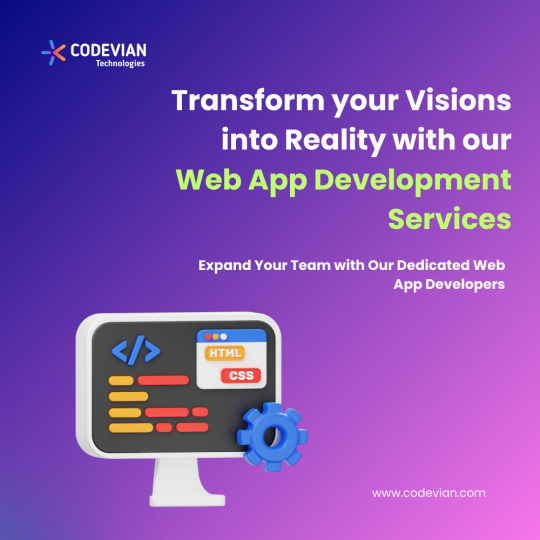
Hey there, tech enthusiasts! So, you've heard about web development and app development, but you're not quite sure what sets them apart? Don't worry, I'll break it down for you in simple terms!
First things first, what exactly is web development? Well, think of it like building a house on the internet! Web development involves creating websites or web applications that can be accessed through a web browser, like Google Chrome or Safari. It's all about designing, building, and maintaining websites that people can visit and interact with online.
Now, let's talk about app development. This is like building a cozy little home on your smartphone or tablet! App development involves creating mobile applications that are installed directly onto your device, like games, social media apps, or productivity tools. It's all about designing, building, and maintaining applications that people can download and use on their mobile devices.
So, what's the difference between web development and app development? Here are a few key distinctions:
Platform: The biggest difference between web development and app development is the platform they're built for. Web app development services focuses on creating websites or web applications that are accessed through a web browser on desktop computers or mobile devices. App development, on the other hand, focuses on creating mobile applications that are installed directly onto a device and accessed through an icon on the home screen.
Technology: Web development typically involves technologies like HTML, CSS, and JavaScript for creating the front end (what users see and interact with) and languages like PHP, Python, or Node.js for creating the back end (the server-side logic). App development, on the other hand, often involves languages like Java or Kotlin for Android development, Swift or Objective-C for iOS development, or frameworks like React Native or Flutter for cross-platform development.
Distribution: Web applications are usually accessible to anyone with an internet connection and can be accessed through a web browser without the need for installation. Mobile applications, on the other hand, need to be downloaded and installed onto a device from an app store like the Apple App Store or Google Play Store.
User Experience: The user experience of web applications and mobile applications can be quite different. Web applications are designed to work across different devices and screen sizes, so they often have a responsive design that adapts to fit the user's device. Mobile applications, on the other hand, are specifically designed for use on mobile devices and can take advantage of features like touch screens, GPS, and push notifications.
In conclusion, while web development and app development share some similarities, such as creating digital experiences for users, they also have key differences in terms of platform, technology, distribution, and user experience. Whether you're interested in building websites or mobile applications, both fields offer exciting opportunities to unleash your creativity and make an impact in the digital world!
2 notes
·
View notes
Text
Advanced Web Development Tools For Efficient PHP Developers
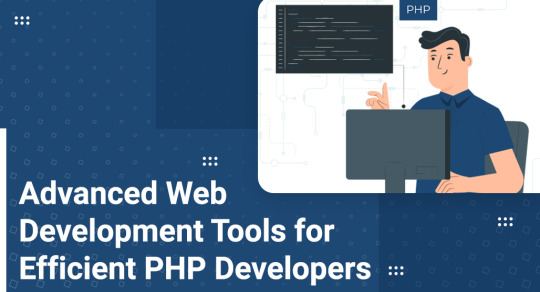
Web Development is working with frontend and backend both languages that are used by programmers and developers to build a well-functioning website or web application. Some of the most commonly used frontend languages are JavaScript, Angular, React, and Vue and backend languages are Python, Java, PHP, and C#.
PHP is the fastest and most widely used server-side scripting language that is ubiquitous in websites and web app development. It is known as a general-purpose scripting language that can be used to develop dynamic and interactive websites. It offers plenty of frameworks and supports several automation tools for application testing and deployment.
Nowadays the market is flooded with many PHP tools, and choosing the right one from among them is a challenging task. Here, we have made a list of leading tools that your development team can utilize to build feature-rich and innovative PHP webs and applications in 2023.
PHPStorm
PHPStorm is the most standard choice because of its nature of being lightweight, extremely fast, and smooth. It simplifies time-consuming tasks such as static code analysis, debugging, and generating functions. PHPStorm is compatible with many frameworks like Symphony, Drupal, Zend, WordPress, Magento, Laravel, etc.
Sublime Text
One of the most customizable, as well as malleable text editors out there for PHP developers, is Sublime Text. This cross-platform source code editor natively supports multiple coding and native mark-up languages.
AWS Cloud9
One of the main benefits of AWS Cloud9 is it is a cloud-based service, which means that it can be accessed from any computer with an internet connection. AWS Cloud9 comes with a code editor, terminal, debugger, and all necessary programming language tools, such as JavaScript, Python, and PHP, etc. It is an impressive feature-filled software that facilitates real-time code collaboration.
Netbeans
Netbeans supports building large-scale web apps and offers a range of languages like English, Simplified Chinese, Brazilian, Japanese, Portuguese, and Russian. It is considered one of the best software for PHP development and is most commonly used for developing PHP applications.
Aptana Studio
Aptana Studio is an open-source integrated development environment (IDE) for building dynamic web applications that use AJAX, PHP, JavaScript, and Ruby on Rails as well as HTML and CSS. It is enabling developers to develop web apps quickly and easily. Its core features include a code assist, built-in terminal, deployment wizard, and integrated debugger.
CodeLobster
CodeLobster IDE from Codelobster software company is the most popular well-liked PHP dev tool for the developer community. It endorses most PHP frameworks like Drupal, Joomla, Symfony, CodeIgniter, Magneto, CakePHP, etc. It supports numerous plugins and a PHP debugger to validate code. It can accelerate and simplify the development process.
Eclipse
It has a huge community of developers who work on all sorts of plug-ins and equip Eclipse with features. Eclipse features include the Eclipse ecosystem, code assist, syntax highlighting, code templates, syntax validation, code formatting, code navigation, and PHP debugging. These features make it easier for you to write better code.
Zend Studio
Zend Studio is a complete Integrated Development Environment (IDE) for professional PHP Web development, debugging, deploying, and managing PHP apps. It is a suitable option for anyone who wants to develop web applications with PHP version 5.5 and above. It offers fast coding along with an intelligent code editor and integrates with Zend Debugger, X-ray, and Xdebug.
These PHP web tools will set up configuration, complete your code intelligently, help to navigate, and check for errors. They are generally open-source and offer excellent features like syntax highlighting and debugging. They will help increase your productivity and efficiency. If you’re planning to get a web app with PHP, then you can contact Swayam Infotech and schedule a meeting for a detailed discussion. Our PHP experts will guide you with your requirements in a perfect way.
#PHP#php developer#php developers#php development#php development solutions#PHP Web Development#php website#php website development#phpdevelopment#Web Developers#Web Development#web development services#website Development#websites
5 notes
·
View notes
Text
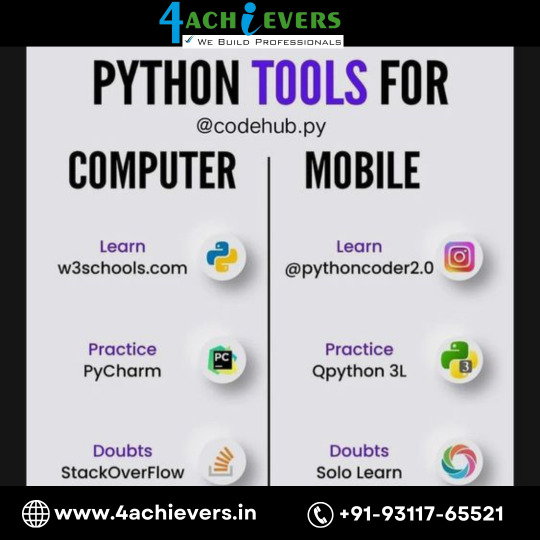
🌐 Python Tools for App Development! 🖥️💻📱
Explore the possibilities of Python in app development!
💡 Desktop Apps:
Develop desktop applications with Tkinter, PyQt, and PySide.
🚀 Mobile Apps:
For mobile, check out Kivy, BeeWare, and SL4A.
📲 Connect with Us:
📞 Contact: 93117-65521
🌟 Learn More
Unleash cross-platform potential with Python! 🐍 #PythonDev #AppDevelopment
3 notes
·
View notes
Text
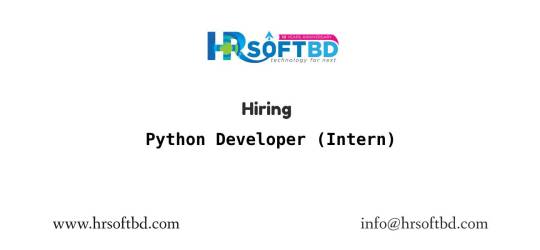
HRsoftBD (https://hrsoftbd.com) is a Website, Software and App Development Company based in Dhaka. We are looking for a Python Developer (Intern) to join our dynamic team. As a Python Developer (Intern), you will be responsible for design & developing high-quality desktop-based applications for cross platforms. The ideal candidate should have a very good knowledge in Python, Desktop Libraries like Tkinter, and SQLite (or similar).
Mail your CV at: [email protected]
Title Should be: Apply for Python Developer (Intern)
Direct Apply from: http://hrsoftbd.com/site/job-apply
Last Date of Application: 15 November 2023
What you’ll do:
Write quality code using Python.
Design desktop UI/UX using Python.
Very good knowledge of Object Oriented.
Work on agile-scrum project teams to deliver software features and enhancements.
SQLite/MySQL Database Maintain and CRUD.
Write clean code as part of a team of software developers
Create acceptance tests for all the code created
Create, review, and update technical documentation
Knowledge on RESTAPI.
You Have:
Minimum Bachelor’s degree in CSE/SE/CS/IT
Knowledge of Python, Object Oriented, SQLite, For Python Desktop any library/framework.
Thorough understanding of MySQL/SQLite
Good behave and communication style
Employment Status
Full-time
Experience Requirements
No experience is required.
Salary
Negotiable
Compensation & other benefits
Yearly 2 bonus (Eid-ul-adha and Eid-ul-fitr)
Weekly 1 Holidays and 1 Half-days
Salary Review: Yearly or Semiannual.
Provident fund (10% extra)
If interested please send your resume at: [email protected]. Title Should be: Apply for Python Developer (Intern).
Wish you all the Best.
HRsoftBD
2 notes
·
View notes
Text
Why Choose Selenium? Exploring the Key Benefits for Testing and Development
In today's digitally driven world, where speed, accuracy, and efficiency are paramount, web automation has emerged as the cornerstone of success for developers, testers, and organizations. At the heart of this automation revolution stands Selenium, an open-source framework that has redefined how we interact with web browsers. In this comprehensive exploration, we embark on a journey to uncover the multitude of advantages that Selenium offers and how it empowers individuals and businesses in the digital age.

The Selenium Advantage: A Closer Look
Selenium, often regarded as the crown jewel of web automation, offers a variety of advantages that play important roles in simplifying complex web tasks and elevating web application development and testing processes. Let's explore the main advantages in more detail:
1. Cross-Browser Compatibility: Bridging Browser Gaps
Selenium's remarkable ability to support various web browsers, including but not limited to Chrome, Firefox, Edge, and more, ensures that web applications function consistently across different platforms. This cross-browser compatibility is invaluable in a world where users access websites from a a variety of devices and browsers. Whether it's a responsive e-commerce site or a mission-critical enterprise web app, Selenium bridges the browser gaps seamlessly.
2. Language Flexibility: Your Language of Choice
One of Selenium's standout features is its language flexibility. It doesn't impose restrictions on developers, allowing them to harness the power of Selenium using their preferred programming language. Whether you're proficient in Java, Python, C#, Ruby, or another language, Selenium welcomes your expertise with open arms. This language flexibility fosters inclusivity among developers and testers, ensuring that Selenium adapts to your preferred coding language.
3. Interaction with Web Elements: User-like Precision
Selenium empowers you to interact with web elements with pinpoint precision, mimicking human user actions effortlessly. It can click buttons, fill in forms, navigate dropdown menus, scroll through pages, and simulate a wide range of user interactions with the utmost accuracy. This level of precision is critical for automating complex web tasks, ensuring that the actions performed by Selenium are indistinguishable from those executed by a human user.
4. Automated Testing: Quality Assurance Simplified
Quality assurance professionals and testers rely heavily on Selenium for automated testing of web applications. By identifying issues, regressions, and functional problems early in the development process, Selenium streamlines the testing phase, reducing both the time and effort required for comprehensive testing. Automated testing with Selenium not only enhances the efficiency of the testing process but also improves the overall quality of web applications.
5. Web Scraping: Unleashing Data Insights
In an era where data reigns supreme, Selenium emerges as a effective tool for web scraping tasks. It enables you to extract data from websites, scrape valuable information, and store it for analysis, reporting, or integration into other applications. This capability is particularly valuable for businesses and organizations seeking to leverage web data for informed decision-making. Whether it's gathering pricing data for competitive analysis or extracting news articles for sentiment analysis, Selenium's web scraping capabilities are invaluable.
6. Integration Capabilities: The Glue in Your Tech Stack
Selenium's harmonious integration with a wide range of testing frameworks, continuous integration (CI) tools, and other technologies makes it the glue that binds your tech stack together seamlessly. This integration facilitates the orchestration of automated tests, ensuring that they fit seamlessly into your development workflow. Selenium's compatibility with popular CI/CD (Continuous Integration/Continuous Deployment) platforms like Jenkins, Travis CI, and CircleCI streamlines the testing and validation processes, making Selenium an indispensable component of the software development lifecycle.
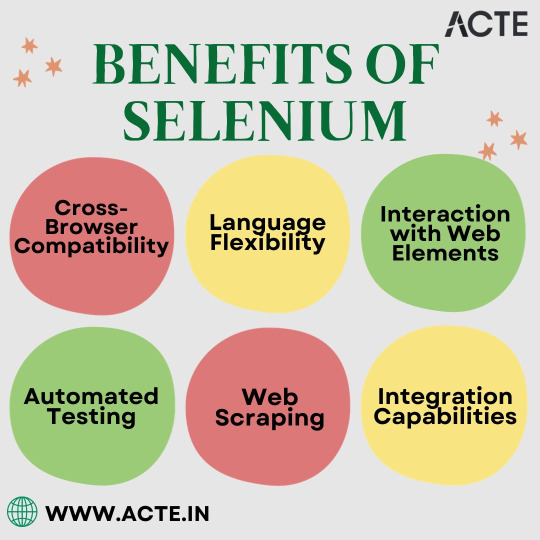
In conclusion, the advantages of using Selenium in web automation are substantial, and they significantly contribute to efficient web development, testing, and data extraction processes. Whether you're a seasoned developer looking to streamline your web applications or a cautious tester aiming to enhance the quality of your products, Selenium stands as a versatile tool that can cater to your diverse needs.
At ACTE Technologies, we understand the key role that Selenium plays in the ever-evolving tech landscape. We offer comprehensive training programs designed to empower individuals and organizations with the knowledge and skills needed to harness the power of Selenium effectively. Our commitment to continuous learning and professional growth ensures that you stay at the forefront of technology trends, equipping you with the tools needed to excel in a rapidly evolving digital world.
So, whether you're looking to upskill, advance your career, or simply stay competitive in the tech industry, ACTE Technologies is your trusted partner on this transformative journey. Join us and unlock a world of possibilities in the dynamic realm of technology. Your success story begins here, where Selenium's advantages meet your aspirations for excellence and innovation.
5 notes
·
View notes
Text
The Best Programming Languages For Beginners

When choosing the right programming language, it’s essential to consider your goals and career. You want to make sure that you choose a programming language that is both in demand and easy to learn. Python is an ideal choice for beginners because it reads like English and has a simplified syntax. It’s also versatile and can be used for anything from web development to software development.
Python
Python is a popular general-purpose programming language that’s easy to learn for beginners and widely used in web development, machine learning, art, automation, and more. It also has a vast community of resources that are available to new programmers.
Java is another widely used programming language, especially for mobile app development. It’s used at companies of all sizes (including HubSpot!) and is one of the easiest to learn if you want to develop for a variety of platforms.Better is to click here or visit our official website to know about Programming question answer.
C is an older programming language but still a good choice for beginners because it’s more “machine-level” and gives you the lowest-level control over computer hardware. It’s also the most common base for other languages, like C# and Ruby.
Java
Despite being not as beginner-friendly as Python, Java is a good programming language to start with. It's a general-purpose programming language with a versatile library and free online tutorials.
It's also a cross-platform language, which makes it suitable for mobile and desktop applications. It's the language of choice for Android development and used in a number of enterprise-level software applications.
C is one of the oldest languages and forms the basis for modern languages like Python, Java, and JavaScript. However, it has a low level of abstraction and requires that code is compiled (translated into machine-readable code) before it can be run. This can make it difficult for beginners to understand. Moreover, its syntax can be confusing. But, it's an excellent foundation for more advanced language learning.
Many people are interested in learning programming, but choosing the best language can be intimidating. Luckily, there are plenty of resources to help you get started. You can learn the basics of multiple languages with a coding boot camp, such as the Georgia Tech Coding Boot Camp, which offers a variety of courses including HTML, JavaScript, and jQuery.
Other popular languages include C, which is a general-purpose, compiled language that’s widely used in back-end software applications like web servers. Python is a versatile programming language that’s easy to learn for beginners and can be used in any application. Ruby is a dynamic, object-oriented language that’s commonly implemented using the Rails framework. Its concise syntax and convention-over-configuration approach makes it easier to build and deploy apps.
Perl
Perl is a high-level dynamic general-purpose scripting language. It is popular among system administrators for its text-processing capabilities, specifically its own in-built version of regular expressions. It is also used for web development and GUI programming.
Beginners can start learning the basics of the programming language by following the free online courses offered on Udemy. These courses begin with basic theory and then move on to specific aspects of the language. They include topics such as lists, arrays, and subroutines. They also cover how to handle errors in coding. Perl has a large community of developers, with over 230 local groups, mailing lists and support/discussion websites. It is also open source and supports more than 25,000 extension modules on CPAN. This flexibility makes it an ideal programming language for beginners.
HTML
Computer programming allows us to create the software and applications that make our lives easier, more entertaining, and more efficient. But deciding which language to learn can be a difficult choice for beginners, particularly when there are so many options available.
youtube
Programming languages may seem different on the surface, but they all have similar structures and features. This means that whichever language you choose to learn, you’ll be learning important coding concepts that will be applicable to any other languages you might decide to explore later on.
Before deciding which programming language to learn, it’s important to consider your goals and current skill level. Once you’ve identified your goals, it’s easy to narrow down your options and find the best programming language for beginners.
2 notes
·
View notes
Text
How to Deploy Your Full Stack Application: A Beginner’s Guide
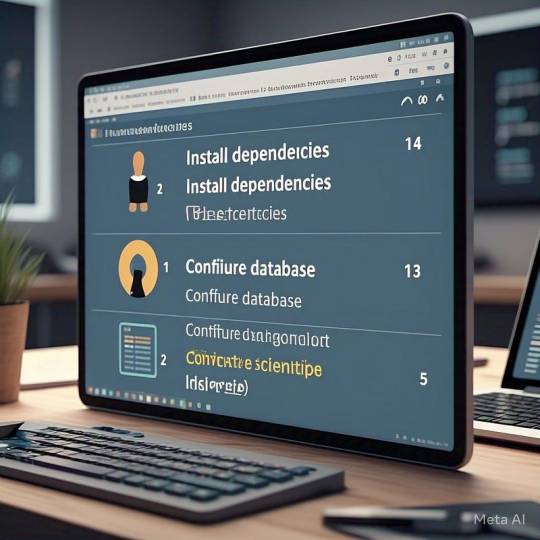
Deploying a full stack application involves setting up your frontend, backend, and database on a live server so users can access it over the internet. This guide covers deployment strategies, hosting services, and best practices.
1. Choosing a Deployment Platform
Popular options include:
Cloud Platforms: AWS, Google Cloud, Azure
PaaS Providers: Heroku, Vercel, Netlify
Containerized Deployment: Docker, Kubernetes
Traditional Hosting: VPS (DigitalOcean, Linode)
2. Deploying the Backend
Option 1: Deploy with a Cloud Server (e.g., AWS EC2, DigitalOcean)
Set Up a Virtual Machine (VM)
bash
ssh user@your-server-ip
Install Dependencies
Node.js (sudo apt install nodejs npm)
Python (sudo apt install python3-pip)
Database (MySQL, PostgreSQL, MongoDB)
Run the Server
bash
nohup node server.js & # For Node.js apps gunicorn app:app --daemon # For Python Flask/Django apps
Option 2: Serverless Deployment (AWS Lambda, Firebase Functions)
Pros: No server maintenance, auto-scaling
Cons: Limited control over infrastructure
3. Deploying the Frontend
Option 1: Static Site Hosting (Vercel, Netlify, GitHub Pages)
Push Code to GitHub
Connect GitHub Repo to Netlify/Vercel
Set Build Command (e.g., npm run build)
Deploy and Get Live URL
Option 2: Deploy with Nginx on a Cloud Server
Install Nginx
bash
sudo apt install nginx
Configure Nginx for React/Vue/Angular
nginx
server { listen 80; root /var/www/html; index index.html; location / { try_files $uri /index.html; } }
Restart Nginx
bash
sudo systemctl restart nginx
4. Connecting Frontend and Backend
Use CORS middleware to allow cross-origin requests
Set up reverse proxy with Nginx
Secure API with authentication tokens (JWT, OAuth)
5. Database Setup
Cloud Databases: AWS RDS, Firebase, MongoDB Atlas
Self-Hosted Databases: PostgreSQL, MySQL on a VPS
bash# Example: Run PostgreSQL on DigitalOcean sudo apt install postgresql sudo systemctl start postgresql
6. Security & Optimization
✅ SSL Certificate: Secure site with HTTPS (Let’s Encrypt) ✅ Load Balancing: Use AWS ALB, Nginx reverse proxy ✅ Scaling: Auto-scale with Kubernetes or cloud functions ✅ Logging & Monitoring: Use Datadog, New Relic, AWS CloudWatch
7. CI/CD for Automated Deployment
GitHub Actions: Automate builds and deployment
Jenkins/GitLab CI/CD: Custom pipelines for complex deployments
Docker & Kubernetes: Containerized deployment for scalability
Final Thoughts
Deploying a full stack app requires setting up hosting, configuring the backend, deploying the frontend, and securing the application.
Cloud platforms like AWS, Heroku, and Vercel simplify the process, while advanced setups use Kubernetes and Docker for scalability.
WEBSITE: https://www.ficusoft.in/full-stack-developer-course-in-chennai/
0 notes
Text
Python Development Company in New York
LDS Engineers – The Leading Python Development Company in New York, when it comes to Python development, LDS Engineers is a famous and relied-on name in New York. We focus on Python software program development and provide remarkable solutions to corporations across various industries. With years of experience in the discipline, we've correctly added custom net packages, dynamic websites, and computing device programs to customers throughout the USA, UK, India, and Australia.

Why Choose Python for Development?
Python is one of the maximum popular and flexible programming languages in the global these days. Businesses choose Python due to the fact it's miles:
Fast and efficient: Python offers brief development, which saves money and time.
Flexible: It may be used for net development, software program programs, artificial intelligence (AI), system learning, and more.
Reliable: Python packages run smoothly and offer amazing performance.
Secure: It comes with built-in protection capabilities, making it a first-rate desire for developing business packages.
At LDS Engineers, we make the maximum of Python’s capabilities to construct sturdy, scalable, and value-powerful applications for our clients.
Our Python Development Services
We provide a wide variety of Python development offerings, such as:
Python Web Development
We increase dynamic and feature-wealthy websites using Python frameworks like Django and Flask. Our websites are consumer-pleasant, responsive, and SEO-optimized.
Custom Python Software Development
Whether you want a custom business utility, CRM, or ERP software, our crew can create a powerful Python-primarily based solution tailor-made to your wishes.
Python Mobile App Development
We build cross-platform cell programs with the usage of Python, ensuring an unbroken experience for both Android and iOS users.
AI and Machine Learning Solutions
Python is widely used for synthetic intelligence and machine-mastering applications. Our group focuses on developing AI-powered solutions for companies.
Data Science and Analytics
We help businesses analyze and visualize statistics the usage of Python-based totally equipment, making it simpler to make knowledgeable business decisions.
Python API Development and Integration
We increase and integrate APIs to beautify the functionality of your Python packages.
Support and Maintenance
Our job doesn’t quit with development. We provide ongoing support, updates, and renovation to make certain that your Python software runs easily.
Why Choose LDS Engineers?
With years of experience in Python development, LDS Engineers sticks out as a dependent Python development organization in New York. Here’s why businesses decide to work with us:
Expert Team: Our group consists of professional Python developers with experience in diverse industries.
Custom Solutions: We tailor our Python development services to fulfill your enterprise's specific needs.
Cost-Effective Services: We deliver extraordinary Python programs at aggressive charges.
On-Time Delivery: We value a while and make sure that each initiative is finished within time limits.
Global Presence: We provide Python development offerings not just in the US but also within the UK, India, and Australia.
Let’s Build Your Next Python Project!
If you’re looking for a reliable Python development services in New York, appearance is not in addition to LDS Engineers. Whether you want a website, cell app, AI answer, or business utility, we are here to help.
Contact us nowadays to discuss your task and get a custom Python answer that suits your business wishes!
python development, python software development, python software development services, python web application development, python website development, python development, python development in us, python development company.
#python development#python software development#python software development services#python web application development#python website development#python development in us#python development company#newyork#nyc#newyorkcity#usa#photography#art#explorepage#rap#trending
0 notes
Text
“Mastering Web Development: Importance, Uses, and Key Advantages Explained”
In the digital era, web development has become a crucial skill, shaping the way businesses, individuals, and organizations interact with their audiences. From simple static pages to complex dynamic applications, web development is the backbone of the internet. Mastering web development allows individuals and businesses to create functional, user-friendly, and high-performing websites, enhancing their digital presence.
Importance of Web Development
Web development is essential for businesses looking to establish credibility and attract customers online. A well-designed website serves as the face of a brand, providing valuable information and engaging experiences to visitors. Additionally, with the rise of e-commerce, social networking, and digital marketing, businesses rely on websites to reach wider audiences and drive conversions. Moreover, organizations, educational institutions, and government agencies use web platforms to provide services, resources, and information to the public efficiently.
Uses of Web Development
Web development has diverse applications across industries. It enables businesses to launch e-commerce platforms, blogs, social media networks, content management systems (CMS), and customer support portals. Developers use frameworks like React, Angular, and Vue.js for front-end development, while Node.js, Python, PHP, and Ruby power the back end. Furthermore, web development extends to progressive web apps (PWAs), enterprise solutions, and cloud-based applications, facilitating seamless user experiences.
Key Advantages of Web Development
Mastering web development offers numerous advantages. First, it ensures customization and scalability, allowing businesses to tailor solutions to their needs. Second, a well-optimized website improves search engine rankings (SEO), increasing visibility and attracting organic traffic. Third, responsive web design guarantees cross-device compatibility, ensuring accessibility across desktops, tablets, and mobile phones. Additionally, web development supports automation, integration, and security, making online transactions safer and more efficient. For professionals, mastering web development opens doors to freelancing, entrepreneurship, and lucrative career opportunities in a tech-driven world.
In conclusion, web development is more than just building websites; it’s about creating engaging, secure, and scalable digital experiences. By mastering web development, individuals and businesses can harness the full potential of the internet and stay ahead in the ever-evolving digital landscape. 🚀
0 notes
Text
Best Language for App Development to Consider in 2025
The world of app development is constantly evolving, with new programming languages, frameworks, and tools emerging to streamline the process. As we step into 2025, choosing the best language for app development is crucial for developers aiming to build efficient, scalable, and high-performing applications. Whether you are an aspiring developer or an experienced programmer, selecting the right programming language can significantly impact your success. In this blog, we will explore the top languages to consider for app development in 2025 and how you can master them through the best course and best training for app development.
1. Kotlin – The Future of Android Development
Kotlin has firmly established itself as the preferred language for Android development, and its popularity continues to grow in 2025. Google officially supports Kotlin for Android apps, making it a powerful choice for developers.
Why Choose Kotlin?
Concise and Expressive: Kotlin's syntax is more concise than Java, reducing boilerplate code.
Interoperability with Java: Developers can seamlessly integrate Kotlin with existing Java codebases.
Coroutines for Better Performance: Kotlin's built-in coroutines make handling asynchronous tasks easier and more efficient.
Officially Supported by Google: With Google's backing, Kotlin receives regular updates and improvements.
2. Swift – The Best Choice for iOS Development
For iOS app development, Swift remains the top programming language in 2025. Apple’s programming language is designed to provide better performance, safety, and ease of use compared to its predecessor, Objective-C.
Why Choose Swift?
Fast and Efficient: Swift is optimized for performance and runs much faster than Objective-C.
Safety First: The language eliminates many common programming errors, making development more secure.
Modern Syntax: Swift’s syntax is clean, readable, and easy to learn.
Seamless Integration with Apple’s Ecosystem: Swift works smoothly with Apple’s APIs and frameworks like SwiftUI and Combine.
3. Flutter (Dart) – The Best Framework for Cross-Platform Apps
Flutter, powered by Dart, is one of the most promising technologies for cross-platform app development in 2025. With a single codebase, developers can create visually stunning applications for both Android and iOS.
Why Choose Flutter?
Single Codebase for Multiple Platforms: Write once, deploy anywhere.
Rich UI with Widgets: Flutter’s widget-based UI system allows for highly customizable designs.
Fast Development with Hot Reload: Instantly view changes without restarting the app.
Growing Community and Support: Flutter is continuously evolving with strong community support.
4. React Native – JavaScript-Based Cross-Platform Development
React Native, developed by Facebook, is another top contender for cross-platform app development. It allows developers to build mobile apps using JavaScript and React.
Why Choose React Native?
Code Reusability: A large portion of the code can be reused across platforms.
Strong Community and Libraries: React Native has an extensive ecosystem of third-party libraries and tools.
Hot Reloading for Quick Development: See real-time changes without recompiling the entire app.
Backed by Facebook and Used by Major Companies: Apps like Instagram, Airbnb, and Walmart use React Native.
5. Python – A Rising Star in Mobile App Development
Although Python is primarily used for web development, machine learning, and data science, its role in mobile app development is expanding in 2025 with frameworks like Kivy and BeeWare.
Why Choose Python?
Easy to Learn and Use: Python has a simple and readable syntax, making it great for beginners.
Strong Community and Libraries: A vast number of libraries support various functionalities.
Growing Support for Mobile Development: Tools like Kivy and BeeWare enable mobile app development using Python.
Ideal for AI-Powered Apps: Python is the go-to language for AI and machine learning, making it perfect for intelligent applications.
6. C# – A Powerful Choice for Game and Enterprise Apps
C# remains a top choice for mobile game development (Unity) and enterprise applications in 2025. Its integration with Microsoft’s ecosystem makes it a solid choice for developers.
Why Choose C#?
Excellent for Game Development: C# is the primary language for Unity, the most popular game development engine.
Strong Support for Enterprise Apps: Many businesses use C# for enterprise solutions.
Cross-Platform Compatibility: Xamarin allows C# apps to run on both Android and iOS.
Robust and Scalable: Ideal for large-scale applications.
Conclusion
The best language for app development in 2025 depends on your goals, the platform you want to develop for, and the type of applications you aim to build. Kotlin and Swift remain the best choices for native Android and iOS development, respectively, while Flutter and React Native dominate cross-platform development. Python and C# are gaining traction for specialized applications like AI and game development.Regardless of the language you choose, enrolling in the best training for app development will accelerate your learning curve and increase your chances of building successful applications. Whether you prefer online or offline learning, finding the best course with industry experts, real-world projects, and certification can give you a competitive edge in the app development field.
0 notes
Text
Top Technologies to Hire Dedicated Developers in India
Hiring dedicated developers in India is a strategic decision for startups, SMBs, enterprises, and tech firms worldwide. India has established itself as a global leader in software development, offering a vast talent pool, cost-effective solutions, and expertise in cutting-edge technologies. Companies looking to hire dedicated developers in India benefit from affordability, expertise, and seamless collaboration with offshore development teams.

However, navigating the hiring landscape while balancing cost, quality, and project execution can be challenging. This guide will help you identify the best technologies to hire dedicated developers in India, explore the top platforms to find dedicated developers in India, and highlight cost-effective ways to hire Indian software developers.
Why India is a Leading Hub for Dedicated Developers
1) Large Talent Pool with Diverse Expertise:
India produces over 1.5 million engineering graduates annually, with expertise in full-stack development, cloud computing, AI, blockchain, and other emerging technologies. This ensures access to a diverse and highly skilled workforce, making it an attractive option to hire Indian software developers for various projects.
2) Cost-Effective Development Without Quality Compromise:
Hiring offshore developers in India can save businesses 40–70% compared to the USA, UK, or Europe, making it a practical option for companies operating under budget constraints.
3) Strong Educational Background & Technical Excellence:
Indian developers have a robust foundation in STEM (Science, Technology, Engineering, and Mathematics), enabling them to excel in problem-solving, software architecture, and complex coding. This makes it easier for companies to hire a dedicated development team in India that aligns with their project needs.
4) Supportive Government Policies & IT Infrastructure:
India’s IT-friendly policies, tax incentives, and world-class tech infrastructure make it a preferred offshore development hub, further boosting the demand for offshore developers in India.
Top Technologies for Hiring Dedicated Developers in India
1. Web Development Technologies
JavaScript Frameworks (React.js, Angular, Vue.js):
React.js — Best for fast, scalable UIs (used by Facebook, Instagram, Airbnb).
Angular — Ideal for enterprise-grade applications with robust architecture.
Vue.js — Lightweight and flexible, perfect for startups and dynamic web apps.
Backend Technologies:
Node.js — Best for real-time applications (used by Netflix, LinkedIn, PayPal).
PHP & Laravel — Cost-effective web development; Laravel ensures security & scalability.
Python & Django/Flask — Ideal for data-driven and high-security applications.
2. Mobile App Development Technologies
Cross-Platform Development:
Flutter — Single codebase for iOS & Android (used by Google Ads, Alibaba, BMW).
React Native — Developed by Facebook, ideal for hybrid mobile applications.
Native Mobile Development:
Swift — Apple’s preferred language for iOS development.
Kotlin — Google-backed, the standard for Android app development.
3. Enterprise & Backend Development Technologies
Java & Spring Boot — Scalable & secure enterprise applications (used in banking & healthcare).
.NET & C# — Best for Microsoft-based enterprise solutions.
Golang — High-performance backend development, cloud computing, AI, and microservices.
4. Emerging & Niche Technologies
Blockchain (Ethereum, Hyperledger) — Ideal for fintech, smart contracts, supply chain management.
AI & Machine Learning (TensorFlow, PyTorch) — Used for chatbots, automation, predictive analytics.
DevOps & Cloud (AWS, Azure, Kubernetes) — Ensures seamless CI/CD pipelines & automated deployments.
Cybersecurity — Essential for data protection and compliance.
Key Factors to Consider When Hiring Dedicated Developers in India
A. Cost & Budget Considerations:
Compare offshore vs. in-house costs.
Assess long-term ROI rather than just initial cost savings.
B. Quality & Skillset Assessment:
Verify developer expertise in relevant technologies.
Review portfolios, case studies, and previous client feedback.
C. Communication & Time Zone Management:
Ensure clear communication via Slack, Zoom, Jira, Trello.
Hire developers comfortable with Agile methodologies.
D. Project Management & Risk Mitigation:
Set clear milestones, deliverables, and quality assurance benchmarks.
Establish security protocols for protecting sensitive information.
Top Platforms to Find Dedicated Developers in India
1) Freelance Platforms:
Upwork, Fiverr — Ideal for short-term projects and independent developers.
2) Dedicated Hiring Platforms:
Turing, Toptal — Pre-vetted developers for high-quality, complex projects.
3) IT Outsourcing Companies & Agencies:
Best for businesses seeking long-term, scalable development teams with end-to-end project management.
4) Direct Recruitment via LinkedIn & Job Boards:
Perfect for startups and enterprises looking to hire full-time developers.
Advantages of Hiring Offshore Developers from India
Cost Savings — Businesses can reduce costs significantly by hiring Indian software developers.
Access to Skilled Talent — A vast pool of developers proficient in the latest technologies.
Scalability — Easily expand or downsize teams based on project needs.
Time Zone Advantage — 24/7 development cycle with overlapping work hours.
Strong Work Ethic — Indian developers are known for their commitment and problem-solving abilities.
How to Hire Dedicated Developers in India
Define Project Requirements — Clearly outline the technologies, skills, and experience needed.
Choose the Right Hiring Model — Decide between freelance, dedicated teams, or IT outsourcing.
Evaluate Developer Skills — Conduct coding tests, portfolio reviews, and technical interviews.
Ensure Smooth Onboarding — Set up communication channels and development workflows.
Conclusion:
Hiring dedicated developers in India is a smart choice for businesses looking to build high-quality software solutions while optimizing costs. With expertise in top technologies like web development, mobile app development, enterprise solutions, and emerging fields like AI and blockchain, India offers a vast talent pool to meet diverse project needs.
By carefully selecting the right technology stack, assessing developer skills, and choosing the best hiring platform, businesses can successfully scale their development teams and achieve long-term success.
Looking to hire dedicated developers in India? Partner with iQlance to get top-tier software developers specializing in web, mobile, and enterprise solutions. Build your dream team with expert developers tailored to your project needs. Contact us today to get started!
#hirededicateddevelopersinindia#besttechnologiestohiredevelopersinindia#toptechnologiesfordedicateddevelopers#hiresoftwaredevelopersinindia#hirewebdevelopersinindia#hiremobileappdevelopersinindia#offshorededicateddevelopersindia#indiadedicateddevelopmentteam#besttechstackforhiringdevelopers#howtohirededicateddevelopersinindia
0 notes